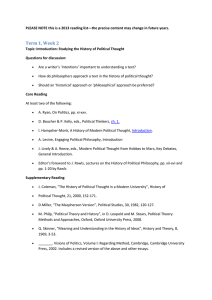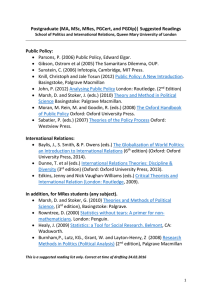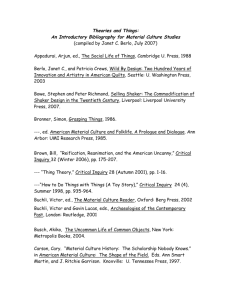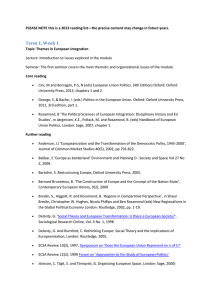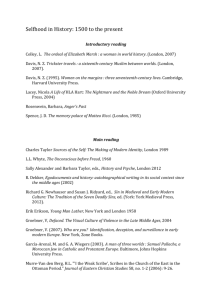IRRU Seminar – October 2015 Stefano Gasparri (University of Warwick)
advertisement
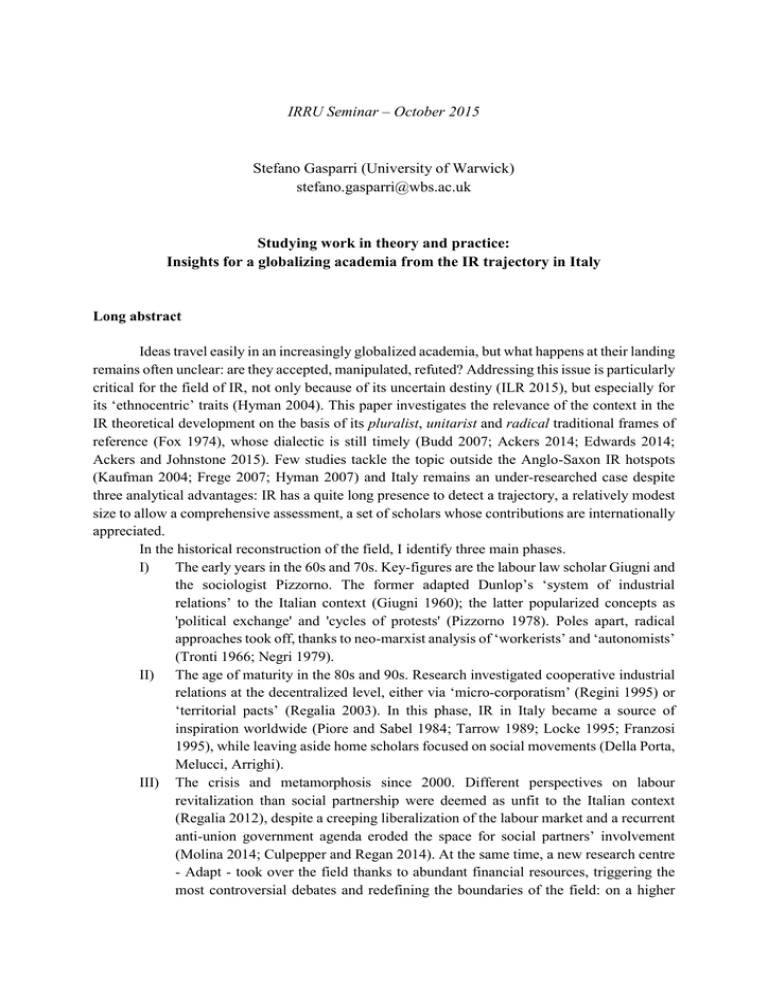
IRRU Seminar – October 2015 Stefano Gasparri (University of Warwick) stefano.gasparri@wbs.ac.uk Studying work in theory and practice: Insights for a globalizing academia from the IR trajectory in Italy Long abstract Ideas travel easily in an increasingly globalized academia, but what happens at their landing remains often unclear: are they accepted, manipulated, refuted? Addressing this issue is particularly critical for the field of IR, not only because of its uncertain destiny (ILR 2015), but especially for its ‘ethnocentric’ traits (Hyman 2004). This paper investigates the relevance of the context in the IR theoretical development on the basis of its pluralist, unitarist and radical traditional frames of reference (Fox 1974), whose dialectic is still timely (Budd 2007; Ackers 2014; Edwards 2014; Ackers and Johnstone 2015). Few studies tackle the topic outside the Anglo-Saxon IR hotspots (Kaufman 2004; Frege 2007; Hyman 2007) and Italy remains an under-researched case despite three analytical advantages: IR has a quite long presence to detect a trajectory, a relatively modest size to allow a comprehensive assessment, a set of scholars whose contributions are internationally appreciated. In the historical reconstruction of the field, I identify three main phases. I) The early years in the 60s and 70s. Key-figures are the labour law scholar Giugni and the sociologist Pizzorno. The former adapted Dunlop’s ‘system of industrial relations’ to the Italian context (Giugni 1960); the latter popularized concepts as 'political exchange' and 'cycles of protests' (Pizzorno 1978). Poles apart, radical approaches took off, thanks to neo-marxist analysis of ‘workerists’ and ‘autonomists’ (Tronti 1966; Negri 1979). II) The age of maturity in the 80s and 90s. Research investigated cooperative industrial relations at the decentralized level, either via ‘micro-corporatism’ (Regini 1995) or ‘territorial pacts’ (Regalia 2003). In this phase, IR in Italy became a source of inspiration worldwide (Piore and Sabel 1984; Tarrow 1989; Locke 1995; Franzosi 1995), while leaving aside home scholars focused on social movements (Della Porta, Melucci, Arrighi). III) The crisis and metamorphosis since 2000. Different perspectives on labour revitalization than social partnership were deemed as unfit to the Italian context (Regalia 2012), despite a creeping liberalization of the labour market and a recurrent anti-union government agenda eroded the space for social partners’ involvement (Molina 2014; Culpepper and Regan 2014). At the same time, a new research centre - Adapt - took over the field thanks to abundant financial resources, triggering the most controversial debates and redefining the boundaries of the field: on a higher level, by rooting it into the Catholic social doctrine (Tiraboschi 2014); more practically, by entrenching it within the HRM approach (Salta 2014). With IR drifting towards unitarism, it does not surprise that leading Italian IR thinkers – Meardi, Baccaro, Pulignano – are all abroad. Overall, these findings clarify that an internationalized academia does not prevent its own national trajectories from diverging. IR in Italy has embraced a firm-oriented perspective: “market without pluralism” (Cella 2013) is the rule, both in practice as well as in theory. On the contrary, prominent Anglo-Saxon schools have devoted remarkable attention to labour-oriented themes (Turner, Katz and Hurd 2001; Frege and Kelly 2004; Simms, Holgate and Heery 2013). This result confirms the ethnocentrism of IR (Hyman 2004), problematizing the possible impact of recent analytical advancements (Whalen et al. 2008; Darlington 2009; Piore 2011; Kochan 2012; Jackson et al. 2013; Vidal and Hauptmeier 2014). However, this paper also demonstrates that IR can easily reconcile ethnocentrism with internationalism through the adoption of the universal compass provided by the ‘frames of reference’. By doing so, the theoretical thickness of the field emerges, and the consequent implications are possibly deep: to thrive in an increasingly globalized academia, shall IR overcome its under-theorisation nature? References: - Ackers, P. (2014), Rethinking the employment relationship: a neo-pluralist critique of British industrial relations orthodoxy, The International Journal of Human Resource Management, 25(18): 2608-2625. - Ackers, P. and Johnstone, S. 92015), Finding a Voice at Work? New Perspectives on Employment Relations, Oxford: Oxford University Press. - Budd, J. (2008), ‘A meta-paradigm for revitalizing industrial relations’, in Whalen, C. (Eds.), New directions in Study of Work and Employment. Revitalizing Industrial Relations as an Academic Enterprise, Cheltenham: Edward Elgar, pp. 48-67. - Cella, G.P. (2013), Mercato senza pluralismo. Relazioni industriali e assetti liberal-democratici, Sociologia del lavoro, 131: 19-36. - Culpepper , P. and Regan, A. (2014), Why don't governments need trade unions anymore? The death of social pacts in Ireland and Italy, Socio-Economic Review, 12(4): 723-745. - Darlington, R. (2009) (Eds.), What’s the point of industrial relations? In defence of critical social science, Manchester: BUIRA. - Edwards, P. (2014), ‘Were the 40 Years of ‘Radical Pluralism’ a Waste of Time? A Response to Peter Ackers and Patrick McGovern’, Warwick Papers in Industrial Relations, 99, IRRU. - Fox, A. (1974), Beyond Contract: Work, Power and Trust Relationships, London: Faber and Faber. - Franzosi, R. (1995), The Puzzle of Strikes: Class and State Strategies in Postwar Italy, Cambridge: Cambridge University Press. - Frege, C. and Kelly, J. (2004) (Eds.), Varieties of Unionism. Strategies for Union Revitalization in a Globalizing Economy, Oxford University Press. - Frege, C. (2007), Employment Research and State Traditions: A Comparative History of Britain, Germany, and the United States, Oxford: Oxford University Press. - Giugni, G. (1960), Introduzione allo studio della autonomia collettiva, Milano: Giuffre’. - Hyman (2004), ‘Is Industrial Relations Theory Always Ethnocentric?’, in Kaufman, B. (Eds.), Theoretical Perspectives on Work and the Employment Relationship, Champaign: IRRA series. - Hyman, R. (2007), An Anglo-European perspective on industrial relations research, Arbetsmarknad & Arbetsliv, 13 (3-4): 29-41. - ILR - International Labour Review (2015), What future for industrial relations?, International Labour Review, 154(1), with contributions by: Hayter (’Introduction’), Hyman (‘Three scenarios for industrial relations in Europe’), Fine (‘Alternative labour protection movements in the United States: Reshaping industrial relations?’), Webster (‘The shifting boundaries of industrial relations: Insights from South Africa’), Sen and Lee (‘Workers and social movements of the developing world: Time to rethink the scope of industrial relations?‘), Keune (‘Shaping the future of industrial relations in the EU: Ideas, paradoxes and drivers of change’), Bosch (‘Shrinking collective bargaining coverage, increasing income inequality: A comparison of five EU countries’). - Jackson, G., Kuruvilla, S. and Frege, C. (2013), Across Boundaries: The Global Challenges Facing Workers and Employment Research, British Journal of Industrial Relations, 51: 425–439. - Kaufman, B. (2004), The Global Evolution of Industrial Relations: Events, Ideas, and the IIRA, Geneva: ILO. - Locke, R. (1995), Remaking the Italian Economy, Ithaca: Cornell University Press. - Kochan, T. (2012), Calling All Academics: Engage in Current Labor and Employment Policy Debates, Labor, 9(4): 61-65. - Molina, O. (2014), Self-regulation and the state in industrial relations in Southern Europe: Back to the future?, European Journal of Industrial Relations, 20(1): 21-36. - Negri, A. (1979), Marx oltre Marx, Milan: Feltrinelli. - Piore, M. (2011), Whither Industrial Relations: Does it Have a Future in Post‐Industrial Society?, British Journal of Industrial Relations, 49(4): 792-801. - Piore, M. and Sabel, C. (1984), The Second Industrial Divide, New York: Basic Books. - Pizzorno, A. (1978), ‘Political Exchange and Collective Identity in Industrial Conflict’, in Crouch, C. and Pizzorno, A. (Eds.), The Resurgence of Class Conflict in Western Europe since 1968, Vol. II, Basingstoke: Macmillan. - Regalia, I. (2003), ‘Decentralizing Employment Protection in Europe: Territorial Pacts and Beyond’, in Zeitlin, J. and Trubek, D. (Eds.), Governing Work and Welfare in a New Economy European and American Experiments, Oxford: Oxford University Press. - Regalia, I. (2012), Italian trade unions: Still shifting between consolidated organizations and social movements?, Management Revue, 23(4): 386-407. - Regini, M. (1995), Uncertain Boundaries. The Social and Political Construction of European Economies, Cambridge: Cambridge University Press. - Salta, G. (2014), Verso la rinascita delle relazioni industriali. Voci, testimonianze ed esperienze aziendali, Giuffrè, Collana ADAPT, n. 13 - Simms, M., Holgate, J. and Heery, E. (2013), Union Voices: Tactics and Tensions in UK Organizing, Ithaca: ILR Press. - Tarrow, S. (1989), Democracy and Disorder. Protest and Politics in Italy 1965-1975, Oxford: Oxford University Press. - Tiraboschi, M. (2014), Reviewing the Idea of Work and its Regulatory Framework from an Anthropological Perspective. Building on John XXIII’s Pacem in terris on its 50th Anniversary, EJournal of International and Comparative Labour Studies, 3(1). - Tronti, M. (1966), Operai e Capitale, Torino: Einaudi. - Turner, L., Katz, H. and Hurd, R. (2001) (Eds.), Rekindling the movement. Labor's Quest for Relevance in the Twenty-first Century, Ithaca: ILR Press. - Vidal, M. and Hauptmeier, M. (2014), ‘Comparative Political Economy and Labour Process Theory: Toward a Synthesis’, in Hauptmeier, M. and Vidal, M. (Eds.), Comparative Political Economy of Work, New York: Palgrave Macmillan, pp. 1-31. - Whalen, C. (2008) (Eds.), New directions in the Study of Work and Employment. Revitalizing Industrial Relations as an Academic Enterprise, Cheltenham: Edward Elgar.
